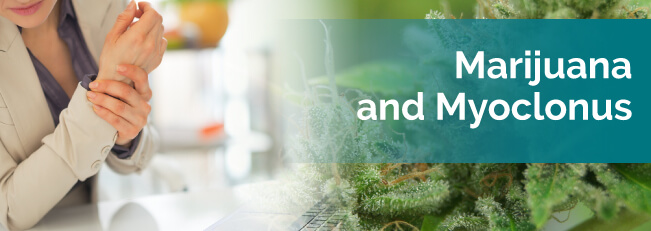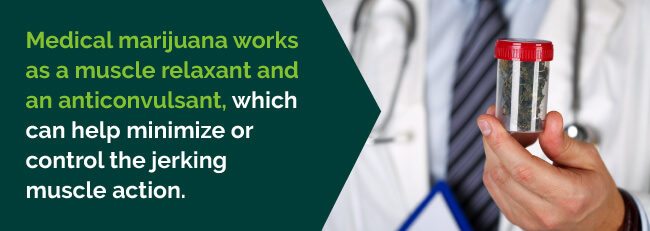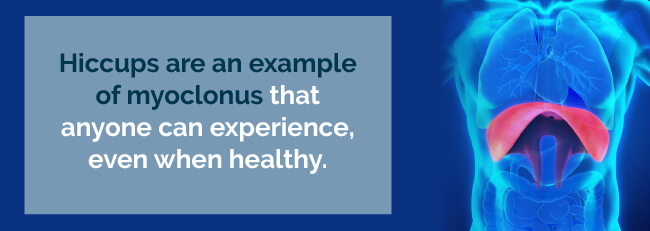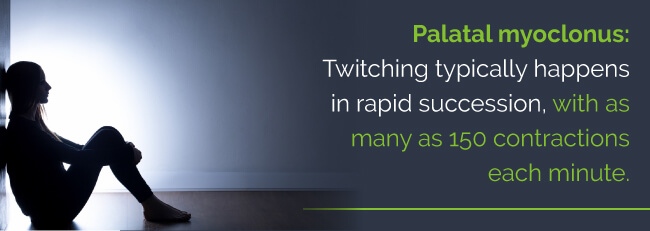
While not a disease on its own, myoclonus is a symptom that can cause limitations on normal activities. The sudden, involuntary muscle jerking is often minor but can become severe.
Prescription medications can help control the jerking in many patients, but some prefer a more natural approach to treatment or don’t find relief from traditional options. Exploring the possibility of using medical marijuana for myoclonus may help you enjoy a more normal life without the harmful side effects of prescription drugs.
Medical marijuana works as a muscle relaxant and an anticonvulsant, which can help minimize or control the jerking muscle action caused by myoclonus. Many of the same prescription drugs used to treat epilepsy are also used to treat myoclonus, even if epilepsy isn’t the underlying cause.
Find A Doctor Find A Dispensary

Since medical cannabis is effective in treating epilepsy in many people, it may also be effective in treating your myoclonus. Studies and anecdotal evidence show that marijuana has a positive effect on muscle spasms as well.
Another potential benefit of marijuana is its anti-anxiety and anti-depressant effect. Not knowing when a myoclonus episode will occur causes anxiety, especially in social situations. Marijuana creates a relaxing feeling that can help relieve that anxiousness.
Specific research regarding medical cannabis and myoclonus is not prevalent. Several studies, however, point to medical weed’s use for anticonvulsant and antiseizure effects. Cannabidiol (CBD), in particular, minimizes seizure activity.
CBD is a cannabinoid that occurs naturally in marijuana. When ingested, it works with the body’s natural endocannabinoid system. CBD, for example, activates CB1 receptors in the body. When activated, that receptor slows neurotransmissions and minimizes neuron excitability, which may help dampen myoclonus.
When using medical cannabis for myoclonus, it’s important to work with an experienced medical marijuana doctor. Your doctor will evaluate your medical history and specific myoclonus symptoms to create a treatment plan suited to your case.
Part of the process is selecting a strain of medical marijuana to use. A strain high in CBD may have the greatest impact on your symptoms. CBD is a non-psychoactive chemical in marijuana, which means it doesn’t cause a “high.” Many strains of medical marijuana contain small amounts of tetrahydrocannabinol (THC) to minimize the cerebral effect of medical cannabis.
When evaluating medical marijuana strains, you’ll notice they are described as Indica or sativa, which are two different plant species. Hybrids combine elements of both.
A strain heavy on Indica tends to have higher levels of CBD. Indica strains have a more sedating effect, which can increase relaxation and sleepiness. The effects tend to work throughout the body. Indica strains work well when you want to relieve twitching and contractions from myoclonus at night so that you can ease the muscle twitching and fall asleep faster.
Sativa strains have higher levels of THC, which results in a greater sense of euphoria. The effects are more cerebral based and may give you an uplifting feeling. THC can be beneficial when you need a burst of energy and creativity while keeping your myoclonus contractions under control. Remember that sativa strains may increase muscle spasms in some people due to the stimulating properties of these strains. For this reason, it may be more beneficial to use Indica strains.
The way you consume the selected strain can also have an impact on how effective medical marijuana is in treating myoclonus. Consider the following methods:
The drawbacks of smoking medical marijuana pertain to the byproducts produced by the combustion of the plant. Smoking may potentially cause respiratory issues as well.
Vaporizing offers almost immediate effects, which is beneficial during a myoclonus episode. You may start noticing reduced muscle spasms after only a few puffs from your vaporizer, which is a huge benefit when you’re experiencing ongoing twitching, especially when it interferes with your activities.

You and your medical marijuana doctor will likely discuss the available forms of medical cannabis and which one would benefit you most, based on your case. Your state’s medical marijuana laws will also have a role, as some states do not allow the smoking of medical weed.
While medical marijuana is a natural option for treating myoclonus, it still has some side effects that you should consider. When comparing the side effects of other treatment options, marijuana’s effects are relatively minor and short-lived.
Some of the effects you may feel with medical marijuana use include:
When comparing the side effects of medical cannabis to prescription drugs, it’s important to consider what you consider a negative. Some people don’t mind the side effects of medical marijuana or even find them useful. If you find it difficult to rest well, the drowsiness you feel from some strains can help you sleep better, for example.
If myoclonus interferes with your daily activities, cannabis may be an effective treatment option for controlling your muscle jerks or twitches. We can help you find a qualified, compassionate medical marijuana doctor in a legal medical cannabis state. Search for a dispensary or a find a doctor near you to take control of myoclonus and improve your quality of life.
Find A Doctor Find A Dispensary
Myoclonus describes a range of quick, sudden and involuntary muscle jerks that can happen in a single muscle or a group of muscles. Scientists believe the symptom often occurs due to a central nervous system disturbance. You cannot stop or control the jerks, and it sometimes increases as you try to move.
The severity of muscle jerking can range from a twitch to an intense contraction that feels like a shock. Positive myoclonus refers to a sudden muscle contraction, while negative myoclonus is a muscle relaxation.
The frequency of myoclonus also varies. You might experience one twitch in isolation or a series of muscle jerks, which may occur with or without a distinct pattern. You may also have one or two twitches within an extended period, or you may experience multiple twitches within a short time span. The muscle jerking can constantly continue in some people.

Some cases of mild myoclonus happen in healthy individuals. Hiccups are an example of myoclonus that anyone can experience, even when healthy. The jerking or “sleep starts” that people sometimes experience shortly after falling asleep are another example. These myoclonus forms do not indicate a problem or lead to any lasting effects or complications.
In severe cases, the contractions increase in intensity in a persistent, widespread manner. Some people may notice the twitching starts in one area and spreads to other muscle groups. In some cases, the jerking is so severe that you have difficulty talking, walking and eating.
Myoclonus can occur without any underlying cause. However, there is typically an underlying condition or external force that initiates the muscle jerking. Some potential situations that cause a myoclonus response include:
Myoclonus is also a symptom of many nervous system disorders and other conditions. Some of these disorders include:
Severe cases of myoclonus can decrease your quality of life by interfering with everyday activities. Because the episodes are unpredictable, patients sometimes suffer from anxiety or avoid certain situations to prevent having an event in public.
The defining characteristic of myoclonus is the muscle jerking. However, there are different kinds of muscle jerks, which affect how the symptom presents itself. Identifying the type of myoclonus and its underlying cause is an essential step in creating an effective treatment plan.
Some key types of myoclonus include:

Physicians use a variety of tests to diagnose myoclonus. The diagnosis typically starts with an overview of your medical history and then a physical exam. The tests performed help rule out other causes, as well as potentially diagnose the underlying condition causing myoclonus.
Some possible tests include:
Finding what is causing your myoclonus helps you and your physician decide what treatments are available and viable for your type of myoclonus.
Traditional treatments may focus on treating the underlying cause of myoclonus and controlling your muscle jerks. In cases resulting from a treatable condition, it’s possible to eliminate the myoclonus by correcting the underlying condition. In other cases, the condition is either unknown or incurable. In these situations, doctor focus on controlling the jerking in the muscles.
Some potential treatments include:
Because myoclonus has different causes, finding the correct treatment often takes time. Patients may take several different prescription drugs to keep their symptoms in check, which can cause multiple side effects that can affect your quality of life.